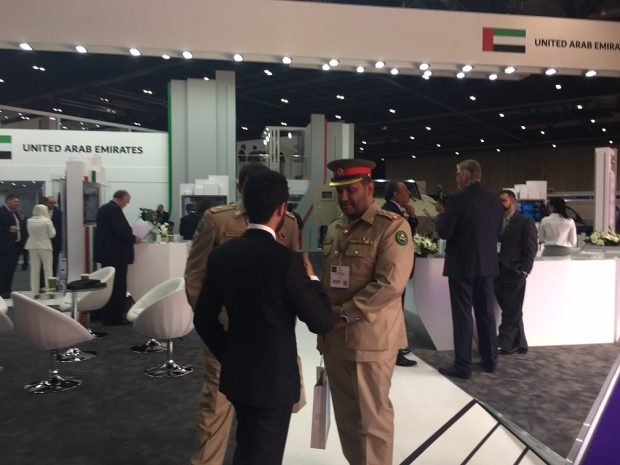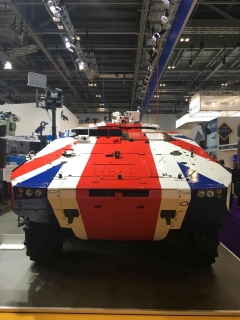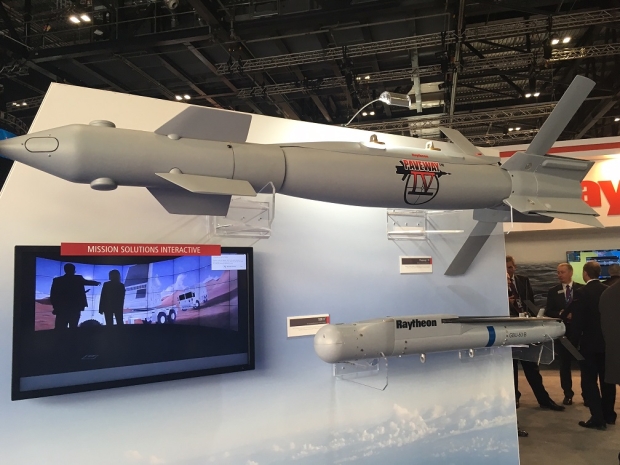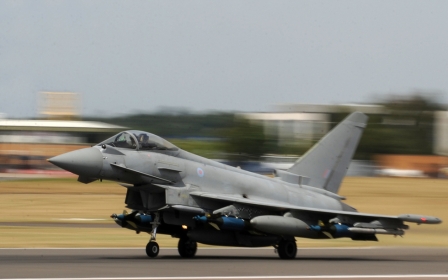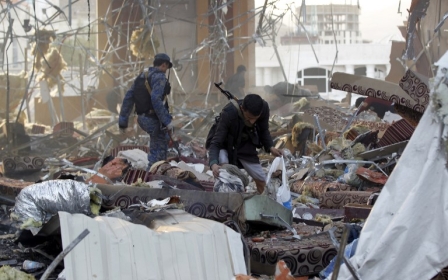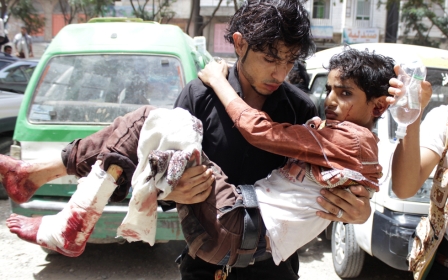London's arms bonanza: From smart bombs to cheap 'donkey-busters'
LONDON - The Royal Air Force group captain guiding a party of dark-suited potential arms buyers did not look impressed. I had just asked a BAE Systems engineer whether the Advanced Precision Kill Weapon System (APKWS) in front of me was a Hellfire missile.
Unlike me, the group captain knew that Lockheed Martin makes the Hellfire, not BAE Systems. Also the Hellfire is for knocking out tanks, whereas the sleek-looking APKWS laser-guided rocket, currently in service with the US and Iraqi air force against the Islamic State, is designed to give a low-cost rocket a surgical strike capability.
There is, he explains, no point wasting an expensive Hellfire or even British-made Brimstone missile on a “guy on a donkey”
“It’s very affordable, that’s part of the appeal,” says Kyle Flynn, the BAE Systems manager from New Hampshire in charge of the APKWS program. He explains that the firm has bolted on a laser-guidance package to a standard rocket. The result, he says, is a weapon that reduces collateral damage to civilians and “our forces”. More than 27 countries, including Saudi Arabia, have already expressed an interest in adding it to their arsenals.
There is, he explains, no point wasting an expensive Hellfire or even British-made Brimstone missile on a “guy on a donkey” or a “Mad Max style improvised armoured vehicle.”
Instead the precision offered by the APKWS “helps end those engagements”, though it is unclear where the US military is facing donkey-riding adversaries. He is less forthcoming when I ask if any have been used over Yemen.
Keeping schtum
At this week’s global arms fair in east London, the Defence and Security Equipment International (DSEI) at the Abu Dhabi-sponsored Excel Centre, few engineers and arms dealers are as open as Flynn though.
The only place where there is no sign of a queue is the ladies lavatories
The biennial event, which opened on Tuesday, will welcome more than 34,000 visitors this week and plays host to exhibits from 1,600 firms, including US and UK giants Lockheed Martin, Boeing, Raytheon and of course, BAE Systems.
By lunchtime on Tuesday the vast halls are packed, and the only place where there is no sign of a queue is the ladies lavatories as heavyset generals and red-faced admirals of many nations jockey for position for everything from assault rifles and armoured personnel carriers to missile-carrying drones and warships.
With more than 2,000 VIP visitors of one-star rank or above on site, there is enough braid on display to sink a battleship, though the largest vessel on display is HMS Argyll, a nearly 30-year-old Royal Navy warship.
Alongside the Type 23 frigate on the dockside are a string of attack and transport helicopters for those with enough oil wealth behind them to wage a war. Nearby to these green machines, armoured Range Rover are parked, offering a secure option for security conscious sheikhs and oligarchs alike.
Deadly and silent
The event comes as the UK’s role supporting Saudi Arabia’s bombing campaign in Yemen is coming under increasing scrutiny, but back inside staff at the MBDA stand aren’t keen to discuss that. The firm produces the deadly Brimstone air-launched ground attack missile. It was designed for the RAF to attack tanks, but has been sold to Saudi Arabia and has been used over Yemen.
Officials from more than 40 countries, including Algeria, Egypt, Kuwait, Oman and Turkey, are exhibiting
Elsewhere, Lockheed Martin’s stand proclaims it’s “engineering a better tomorrow” while the Paveway IV, also used over Yemen, is described as the “global gold standard” of modern anti-ground weapons.
There are no price tags in sight. “We don’t discuss that,” said one salesman, moving on as soon as he spots my media badge.
The International Trade Secretary, Liam Fox, addressed an audience of arms executive and military officers on Tuesday afternoon, extending a warm welcome to the various invitees, including those from Middle East states linked to ongoing human rights abuses, such as Bahrain, UAE and Saudi Arabia.
Officials from more than 40 countries, including Algeria, Egypt, Kuwait, Oman and Turkey are exhibiting, and military officers from Qatar are also due to visit, as both sides of the Gulf crisis look to boost their military spending.
Fox used his address to offer a bullish defence the UK’s multi-billion dollar arms industry, and said Britain had one of the most sophisticated export licensing regimes in the world.
He spoke from a stage sponsored by the UAE firm NIMR Automotive which is at DSEI to promote its range of armoured vehicles. He told the audience there were “inherent risks” involved in the export of arms, but said export rules are “not designed to hinder trade or prohibit exports”.
He said: "If nations and peoples have an inalienable right to look after their own defence, those of us from advanced economies must remember that if we do not provide countries with means of defending themselves, then we will see a proliferation of uncontrolled and unregulated arms sales free from oversight or inhibitions.”
He added: "To allow such a situation to develop would be vastly irresponsible."
He also used the speech to promote fresh arms sales to UAE, Indian and Poland and revealed that £30bn worth untapped credit, guarantees and financial support from the government is available to boost exports in the defence, aerospace and other areas of advanced manufacturing.
'Biggest and best'
Organisers say this year’s DSEI event is the “biggest and best” and hundreds of British soldiers, sailors and airmen have been drafted in as official guides and to help keep an eye on the visitors from more than 100 nations. Organisers have also welcomed five new exhibitor nations, including the UAE.
At the UAE stand, the JAIS 6x6 fighting vehicle stands in pride of place, a sign to the state’s ambition to expand its domestic arms industry. Leather and glass dominate the stand’s conference rooms, but before I can mount the JAIX to test its heavy machine gun, a polite young saleswoman intervenes.
Despite the prominent UAE flags, the badge on the inside of the vehicle's door suggests it was produced with the assistance of Denel Vehicle Systems in South Africa, but it soon becomes clear that the helpful saleswomen doesn’t have the “authority to speak” to this and can’t tell me where UAE-based NIMR Automotive hoped to sell the vehicle.
In fact, nobody on the stand will speak to me and journalists are told only that they must submit any questions in advance. This is a common theme at DSEI, where few are willing to discuss price lists or the end use of their weapons systems.
Hundreds protest
Outside the Abu Dhabi-sponsored conference hall, near to the Emirates-sponsored cable car across the Thames, hundreds of protesters, many of them angry at the Saudi and UAE bombing campaign in Yemen, have spent the last week trying to disrupt the event.
One hundred have been arrested and on Tuesday it emerged that street artist Banksy provided an exclusive new piece for an art exhibition set up in opposition to DSEI. This came after a poll for Campaign Against the Arms Trade showed that, unlike many of those inside the hall, 76 per cent of the British public are opposed to the promotion of arms sales to human rights abusing countries.
Andrew Smith, spokesperson for Campaign Against the Arms Trade, told MEE: “DSEI has brought together those that have inflicted a brutal bombardment and a devastating humanitarian crisis on the people of Yemen. They will be brought together with the same companies that have profited from it every step of the way. None of this would be possible without the full support of Downing Street and Whitehall.”
Back inside the hall it is not all explosives and cruise missiles though. In a corner tucked away by a Royal Air Force Tornado fighter jet is Russ Taylor and his firm Air Drop Box.
They hope to convince the airforce officers at the show to drop their biodegradable and low-cost parachute supply packages on besieged Syrian cities in need of humanitarian aid.
“Of course there is some irony in us being here,” he says. “But I need to speak to the decision makers and I can’t get in the door at Whitehall.”
Middle East Eye propose une couverture et une analyse indépendantes et incomparables du Moyen-Orient, de l’Afrique du Nord et d’autres régions du monde. Pour en savoir plus sur la reprise de ce contenu et les frais qui s’appliquent, veuillez remplir ce formulaire [en anglais]. Pour en savoir plus sur MEE, cliquez ici [en anglais].


